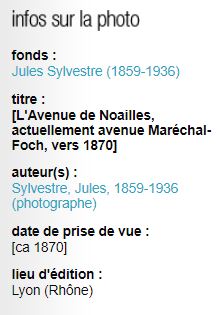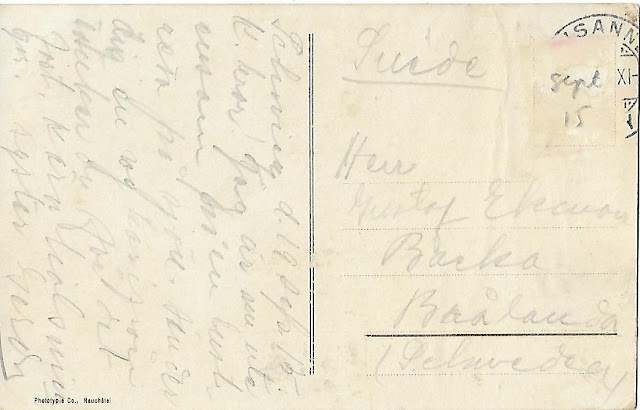My dear brother, How are you? It is a long time I heard anything from you. Write me a card in english. Want to see if you forgot how. Love from Gerda. - I am quite well, hope you all are. - What kind of weather have you?
Lyon, 28 maj 1917
Käre bror! Hur mår du? Det var länge sedan jag hörde något från dig. Skriv ett kort till mig på engelska. Jag vill se om du har glömt hur. Kära hälsningar, Gerda. - Jag mår bra, hoppas ni alla gör det också. - Vad för slags väder har ni?
28th May, 1917: Gerda writes to her brother in English, and asks him to also write back to her in English. She says she wants to see if he can still manage it. (It's been six years since they both returned to Sweden from America.)
However, from the next card (9th July, below), it's made clear that Gerda also thinks that cards written in English may more easily pass the censorship of the military authorities. That such censorship did occur is proved by stamps on some of the cards in this post.
From what Gerda writes about not receiveing any news from Sweden it is also obvious that the postal services are getting increasingly unreliable. I think that by writing in English, she was hoping that her cards would not be put aside as suspcious just because there was no one at the Military Authorities that could read Swedish.
G.086.03 - Evian-les-Bains, Lake Geneva
 |
| 77 EVIAN-LES-BAINS. - La Jetée et la Ville. - LL. |

To: Mr Gustaf Ekman, Backa, Brålanda, Suède (Sweden)
From: Gerda (Lyon, 10.7.17)
Lyon, July 9th '17
Dear brother! How are you, did you get my card I wrote you in english? some time ago now. I have had no news from Sweden for about two months. I don't understand why. Write me a card in english soon. Perhaps that will go quicker. Please write soon! - I am very well, soon going to the country. You can see the boat on the other side. Love to all, Gerda.
Lyon, 9 juli 1917
Käre bror! Hur mår du? Fick du mitt kort som jag skrev till dig på engelska? för en tid sedan? Jag har inte hört något från Sverige på ca två månader. Jag förstår inte varför. Skriv ett kort till mig på engelska. Kanske det går fortare. Var snäll och skriv snart! - Jag mår bra, reser snart till landet. Du kan se båten på andra sidan. Kära hälsningar till alla, Gerda.
"Soon going to the country" - and referring to the boat on the front of the postcard. This seems to imply that they're planning another trip to Evian-les-Bains, and across Lake Geneva to Switzerland.
G.087.01 - The Alps
 |
| J.J. 8021 Lac du Grand Saint Bernard |
Great St Bernard Lake (French: Lac du Grand St-Bernard, Italian: Lago del Gran San Bernardo) is a mountain lake of the Pennine Alps, located south-west of Great St Bernard Pass. It is divided between Switzerland and Italy, although it lies south of the Alps. The lake is located at a height of 2,447 metres above sea level and has a maximum length of 350 metres.
 |
"Ouvert par l'Autorite Militaire"
"Opened by the Military Authority" |
To: Monsieur Gustaf Ekman, Backa, Brålanda, Suède
From: Gerda (Lyon, 24.7.1917) -
Lyon, 31 av. de Noaïlles
July 24th
My dear Brother, I wonder if you ever got my cards I wrote you a long time ago. I have had no news from Sweden for three months. Love, Gerda - Write me a card in english as soon as you get this. Don't send it over Switzerland, send it like always, the old adress.
Lyon, 31 av. de Noaïlles
24 juli
Käre bror! Jag undrar om du någonsin fick mina vykort som jag skrev för länge sen. Jag har inte hört någonting från Sverige på tre månader. Kära hälsningar, Gerda. - Skriv ett kort till mig på engelska så snart du får detta. Skicka det inte via Schweiz, skicka det som vanligt, den gamla adressen.
Two weeks later, Gerda is still writing from Lyon. I think this is the first time I've seen her add her street address on a postcard. Perhaps with the double purpose of making sure that Gustaf hasn't lost her address, and to show the Military Authorities that she has nothing to hide: This is simply a private greeting from a sister to a brother.
G.087.02 - Lausanne
 |
| Lausanne et les Alpes de Savoie |
To: Herr Gustaf Ekman, Backa, Brålanda, Suède (Schweden)
From: Gerda (Lausanne, Switzerland, 12.9.1917)
Lausanne d. 12 sept '17
Käre bror! Sänder dig härmed de käraste hälsningar, hoppas du mår bra. Jag mår utmärkt. Har du fått mina kort. Skriv snart är du snäll. / Syster Gerda.
Lausanne, 12 September 1917
Dear brother, hereby sending you my best wishes. Hope you are well. I'm very well. Have you received my cards. Please write soon. / Sister Gerda
In mid September, she is writing from Lausanne in Switzerland. She does not mention how long they've been there. (I get the impression that when they went travelling they were usually away for a couple of months or so.) She's keeping the message on this card very short, but it seems that she still hasn't heard back from Gustaf. Maybe she had also written more cards in between that never reached him.
G.087.03 - Heureux Noël (Merry Christmas)
 |
Heureux Noël - DIX 584/2
Dans ce mignon sabot vous trouverez l'emblème
Du bonheur que mon coeur souhaite a ceux qu'il aime! |
Merry Christmas
"In this cute clog you will find the emblem
of the happiness my heart wishes to those it loves!"
To: Monsieur Gustaf Ekman, Backa, Brålanda, Sweden
From: Gerda (Lyon, 26.11.1917)
"Ouvert par l'Autorite Militarie"
Opened by the Military Authorities
31 av. de Noailles, Lyon, 25 Nov '17
Käre bror. Hur mår du, det är så länge sedan jag hörde något från dig. Kanske du har flyttat nu. Jag önskar dig på det hjärtligaste en god jul och gott nytt år! Kära hälsningar, Gerda
31 av. de Noailles*, Lyon, 25 November 1917
Dear brother. How are you? It's been so long since I heard anything from you. Perhaps you have moved now. I send you my heartfelt wishes for a Merry Christmas and a Happy New Year. Love, Gerda.
Towards the end of November, Gerda is back in Lyon again, sending early Christmas greetings.
A Google search for the address *L'Avenue de Noialles leads me to a website from Bibliothèque Municipale de Lyon, and a street photo from c. 1870 (below). Nowadays the street is called Avenue Maréchal-Foch. In 1917, it probably didn't look all that different (perhaps with bigger trees, though?) I think we can assume that Gerda lived (with her employer/s) in a flat in a building like one of these:
Going on to look up Bibliothèque Municipal de Lyon, a French Wikipedia article informs me that its history goes all the way back to a Jesuite college in the 16th century. Their library was later incorporated in public libraries.My French is not good enough to understand the whole article - but by putting part of the text into Google Translate, I came up with this: The lending service is provided by the active town hall libraries, the origin of which dates back to the municipal decree of July 1, 1871. There followed the creation of borough libraries, "depots of books open every evening between 7 p.m. and 8 p.m.”, which closed during the First World War.
... closed during the First World War... What a pity. Just as I was beginning to imagine Gerda dropping in at her local borough library on her evenings off, to improve her French! Ah well - I'm not going to let that stop me from linking to...

SVENSKA:
28 maj 1917: Gerda skriver till sin bror i Sverige på engelska, och ber honom också använda engelska när han skriver tillbaka till henne. Hon säger att hon vill se om han fortfarande kan. (Det är sex år sedan de båda återvände till Sverige efter nio år i Amerika.) Men av nästa kort framgår att Gerda också hoppas på att kort skrivna på engelska kanske lättare ska passera de militära myndigheternas brevcensur. (Antagligen inser hon att det finns risk att korrespondens på svenska kan bli lagd åt sidan i brist på tolkar som kan läsa det språket.) Vi har också här de första exemplen på poststämplar som visar att vykorten passerat kontroll av de militära myndigheterna. Det är uppenbart att postgången blivit allt mer opålitlig.
Den 9 juli skriver Gerda (från Lyon) att hon snart ska resa "till landet". Antagligen menar hon Genèvesjön igen - Evian-les-Bains och Lausanne tycks vara återkommande resmål. Två veckor senare, den 24 juli är hon dock fortfarande i Lyon. Men 12 september skriver hon från Lausanne.
28 november är hon åter i Lyon och skriver en julhälsning i god tid därifrån.
En sökning på adressen
L'Avenue de Noialles Lyon tar mig till en arkivbild från det kommunala bibliotekets i Lyon websida: Ett foto av Avenue de Noialles från 1870. Senare har den bytt namn till Avenue Maréchal-Foch. Men 1917 såg den antagligen inte så mycket annorlulnda ut än 1870. (Kanske hade träden växt till sig lite?) Jag tänker mig därför att Gerda (tillsammans med sin/a arbetsgivare) måste ha bott i en lägenhet i ett hus liknande dem på bilden.
När jag fortsätter och även söker information om Bibliothèque Municipal de Lyon, så hittar jag en fransk Wikipedia-artikel som informerar mig om att dess historia går tillbaka ända till ett jesuitiskt college på 1500-talet. Dess bibliotek införlivades senare med kommunala bibliotek öppna för allmänheten. Det fanns även små stadsdelsbibliotek som höll öppet mellan 7-8 på kvällarna - men under första världskriget hölls dessa stängda.
Och jag som just var på väg att föreställa mig Gerda slinka in på sitt lokala bibliotek när hon hade någon kväll ledig, för att förbättra sin franska! Nåja - jag låter inte det hindra mig från att länka till Sepia Saturday 608 (med en bild från ett bibliotek som insprationsbild!)

















































